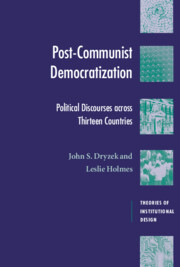Part IV - Transition torn by war
Published online by Cambridge University Press: 22 September 2009
Summary
Yugoslavia aside, the three countries we group in part IV were those most torn by war in the 1990s. The relationship between war, state-building, and democratic development is a complex one; many states were forged in the experience or threat of war, and the implication of total war for democratic development is not necessarily negative (as the experience of the Federal Republic of Germany suggests). Still, in the context of extraction from communism, a successfully prosecuted war (as in Armenia) might be positive when it comes to state-building, but negative for democracy if the passions aroused threaten to undermine the legitimacy of governments. An unsuccessful war, as in Georgia, can easily carry over into civil chaos. In Armenia, Moldova, and Georgia alike, military mobilization, at least in the short run, constituted a necessity that trumped democratic procedures; and resources were diverted to the war effort that could otherwise have been used in economic development. War is also not generally conducive to foreign investment in a country. Given all the other problems that these three countries shared with the other successor states of the Soviet Union discussed in part III, it is perhaps remarkable that they all exited the decade with governments installed by competitive election, however tenuous the accomplishment.
- Type
- Chapter
- Information
- Post-Communist DemocratizationPolitical Discourses Across Thirteen Countries, pp. 131 - 132Publisher: Cambridge University PressPrint publication year: 2002

